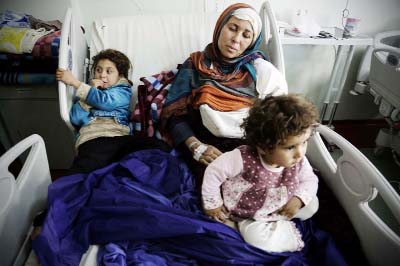
AP, Irbil :
The mortar attack that left Um Yousef blind in one eye and killed two of her children came on the same day that Iraqi forces retook her neighborhood in eastern Mosul from the Islamic State group.
“We were supposed to be liberated that day,” she said from her hospital bed in the nearby city of Irbil. She asked to only be identified by a nickname to protect her family members still living inside Mosul.
Doctors at West Irbil Emergency Hospital say cases like Um Yousef’s are on the rise as Iraqi forces continue to make gains against IS in their effort to take control of Mosul.
The blast of the attack that wounded Um Yousef ripped open her daughter’s stomach, killing her instantly. Her son Yousef was hit in the head with shrapnel and he slowly bled out as they waited for hours for help. As Um Yousef was evacuated by the Iraqi military, her husband stayed behind in Mosul to bury the two children.
“I called him by phone, but he just cries, saying nothing,” she said. Her youngest daughter, just over a year old who lost three of her toes to the blast, played in her lap.
When the operation to retake Mosul was launched in October more than a million people were estimated to still be living inside the city. While Iraqi forces largely evacuated civilians from cities like Ramadi and Fallujah that were retaken from IS last year, in Mosul they told people to stay put.
Since Iraqi forces pushed into Mosul’s city limits in November, the fight has seen relatively high numbers of civilian casualties. In the first week of January the United Nations said 683 people were injured in the city, and at least 817 were wounded during the last week of December.
“You would expect in a conflict like this that the number of civilian casualties would be around 15 percent, a high of 20 percent. What we’re seeing in Mosul is that nearly 50 percent of all casualties are in fact civilians,” Lise Grande, the U.N.’s humanitarian coordinator in Iraq, told reporters at a briefing last week.
“It’s clear that this is because of direct targeting by combatants,” she said, explaining that IS fighters are targeting civilians as they try to flee militant-held parts of the city.
Aid groups opened two new hospitals closer to Mosul this month in an effort to see more civilians faster, but West Irbil Emergency Hospital still receives dozens of injured civilians from Mosul every day and is still operating above capacity, said the hospital’s administrator, Dr. Lawand Meran.
“We are running out of everything, clean gauze, hospital gowns, even simple saline solution,” said Hazhen Mama, a surgeon.
The mortar attack that left Um Yousef blind in one eye and killed two of her children came on the same day that Iraqi forces retook her neighborhood in eastern Mosul from the Islamic State group.
“We were supposed to be liberated that day,” she said from her hospital bed in the nearby city of Irbil. She asked to only be identified by a nickname to protect her family members still living inside Mosul.
Doctors at West Irbil Emergency Hospital say cases like Um Yousef’s are on the rise as Iraqi forces continue to make gains against IS in their effort to take control of Mosul.
The blast of the attack that wounded Um Yousef ripped open her daughter’s stomach, killing her instantly. Her son Yousef was hit in the head with shrapnel and he slowly bled out as they waited for hours for help. As Um Yousef was evacuated by the Iraqi military, her husband stayed behind in Mosul to bury the two children.
“I called him by phone, but he just cries, saying nothing,” she said. Her youngest daughter, just over a year old who lost three of her toes to the blast, played in her lap.
When the operation to retake Mosul was launched in October more than a million people were estimated to still be living inside the city. While Iraqi forces largely evacuated civilians from cities like Ramadi and Fallujah that were retaken from IS last year, in Mosul they told people to stay put.
Since Iraqi forces pushed into Mosul’s city limits in November, the fight has seen relatively high numbers of civilian casualties. In the first week of January the United Nations said 683 people were injured in the city, and at least 817 were wounded during the last week of December.
“You would expect in a conflict like this that the number of civilian casualties would be around 15 percent, a high of 20 percent. What we’re seeing in Mosul is that nearly 50 percent of all casualties are in fact civilians,” Lise Grande, the U.N.’s humanitarian coordinator in Iraq, told reporters at a briefing last week.
“It’s clear that this is because of direct targeting by combatants,” she said, explaining that IS fighters are targeting civilians as they try to flee militant-held parts of the city.
Aid groups opened two new hospitals closer to Mosul this month in an effort to see more civilians faster, but West Irbil Emergency Hospital still receives dozens of injured civilians from Mosul every day and is still operating above capacity, said the hospital’s administrator, Dr. Lawand Meran.
“We are running out of everything, clean gauze, hospital gowns, even simple saline solution,” said Hazhen Mama, a surgeon.

